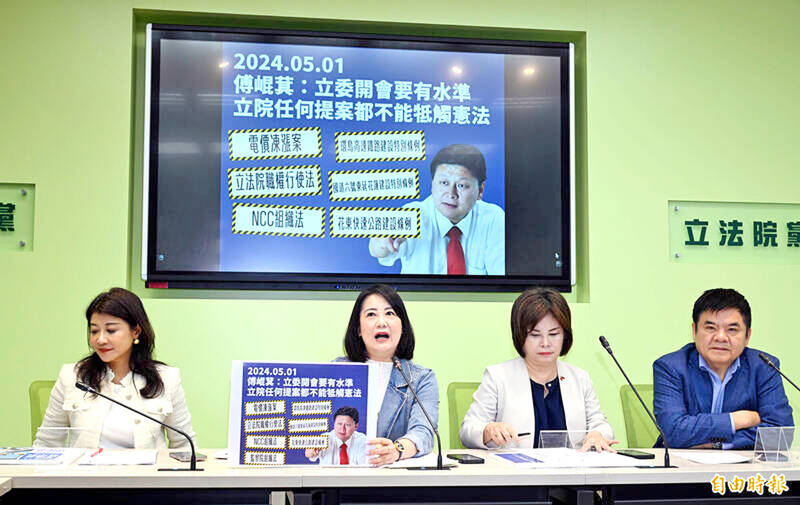Members of the Democratic Progressive Party (DPP) and Taiwan Statebuilding Party (TSP) yesterday accused Chinese Nationalist Party (KMT) caucus whip Fu Kun-chi (傅?萁) of trying to nullify security laws and undermine national sovereignty in the legislature after returning from China.
Fu led 16 KMT lawmakers and a number of party officials on a visit to China earlier this week, and soon after returning has been vigorous in his efforts to amend the Anti-Infiltration Act (反滲透法) and other national security laws, TSP secretary-general Wu Hsin-tai (吳欣岱) told a news conference in Taipei.
People are seeing KMT lawmakers colluding with China to subvert Taiwan’s sovereignty by planning to nullify punishments, Wu said, also accusing Taiwan People’s Party (TPP) lawmakers of collaborating with the KMT to diminish the public’s will to fight for Taiwan.

Photo: Liao Chen-huei, Taipei Times
“We have these so-called opposition parties sitting in the legislature who are willing collaborators for China, so who needs an enemy?” Wu said, demanding that DPP legislators stand firm.
TSP Kaohsiung City Councilor Chang Po-yang (張博洋) said that China has been bullying Taiwan for decades, now with constant military intimidation.
“But Fu sees none of that and instead loves going to China, always speaking of the need to depend on the Chinese market for Taiwan to have economic prosperity,” Chang said. “Decoupling links to China has become a common trend among democratic nations, but Fu and other KMT members want to do the reverse.”
However, Beijing officials belittled Fu and his delegation, as they offered very little in return for their visit and did not open up and allow Chinese tourists to visit Taiwan as Fu had hoped for, Chang added.
Separately yesterday, Minister of Foreign Affairs Joseph Wu (吳釗燮) responded to Fu on Wednesday pressuring other lawmakers to change the word “China” to “mainland” and “nation” to “Taiwan” in legislation.
“I think this action is not necessary, and Taiwanese would find it quite unbelievable,” he told a hearing at the legislature. “Official government papers have long had a tradition of finding an appropriate way when addressing the country across the Taiwan Strait, therefore I think everyone should respect such tradition.”
Meanwhile, Vice Premier Cheng Wen-tsan (鄭文燦) said he sees no need to change the terminology.
“In the past, people have used various terms when at different events; some spoke of China, others of the mainland,” he said. “It is still what people use during those occasions, but it points out that across the Taiwan Strait are two separate political entities.”
DPP Legislator Rosalia Wu (吳思瑤) castigated Fu’s trip as groveling to Chinese leaders and taking instructions.
“Fu’s actions speak volumes,” she said.

Chinese spouse and influencer Guan Guan’s (關關) residency permit has been revoked for repeatedly posting pro-China videos that threaten national security, the National Immigration Agency confirmed today. Guan Guan has said many controversial statements in her videos posted to Douyin (抖音), including “the red flag will soon be painted all over Taiwan” and “Taiwan is an inseparable part of China,” and expressing hope for expedited reunification. The agency last year received multiple reports alleging that Guan Guan had advocated for armed reunification. After verifying the reports, the agency last month issued a notice requiring her to appear and explain her actions. Guan

GIVE AND TAKE: Blood demand continues to rise each year, while fewer young donors are available due to the nation’s falling birthrate, a doctor said Blood donors can redeem points earned from donations to obtain limited edition Formosan black bear travel mugs, the Kaohsiung Blood Center said yesterday, as it announced a goal of stocking 20,000 units of blood prior to the Lunar New Year. The last month of the lunar year is National Blood Donation Month, when local centers seek to stockpile blood for use during the Lunar New Year holiday. The blood demand in southern Taiwan — including Tainan and Kaohsiung, as well as Chiayi, Pingtung, Penghu and Taitung counties — is about 2,000 units per day, the center said. The donation campaign aims to boost

The Kaohsiung Tourism Bureau audited six hotels in an effort to prevent price gouging ahead of Korean band BTS’ concert tour in the city scheduled for Nov. 19, 21 and 22 this year. The bureau on Friday said that the audits — conducted in response to allegations of unfair pricing posted on social media — found no wrongdoing. These establishments included the local branches of Chateau de Chine, Hotel Nikko, My Humble House, and Grand Hai Lai, it said, adding that the Consumer Protection Commission would have penalized price gougers had the accusations been substantiated. The bureau said the Tourism Development Act

BACK TO WINTER: A strong continental cold air mass would move south on Tuesday next week, bringing colder temperatures to northern and central Taiwan A tropical depression east of the Philippines could soon be upgraded to be the first tropical storm of this year, the Central Weather Administration (CWA) said yesterday, adding that the next cold air mass is forecast to arrive on Monday next week. CWA forecaster Cheng Jie-ren (鄭傑仁) said the first tropical depression of this year is over waters east of the Philippines, about 1,867km southeast of Oluanpi (鵝鑾鼻), and could strengthen into Tropical Storm Nokaen by early today. The system is moving slowly from northwest to north, and is expected to remain east of the Philippines with little chance of affecting Taiwan,